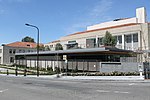College Women's Club
AC with 0 elementsAmerican Craftsman architecture in CaliforniaClubhouses on the National Register of Historic Places in CaliforniaHistory of women in CaliforniaWomen's club buildings in California ... and 2 more
Women's clubs in the United StatesWomen's organizations based in the United States

The College Women's Club was a women's club founded in 1920 based in Berkeley, California. It organized Berkeley's first cooperative day nursery and established scholarships.
Excerpt from the Wikipedia article College Women's Club (License: CC BY-SA 3.0, Authors, Images).College Women's Club
Bancroft Way, Berkeley
Geographical coordinates (GPS) Address Nearby Places Show on map
Geographical coordinates (GPS)
| Latitude | Longitude |
|---|---|
| N 37.869222 ° | E -122.255514 ° |
Address
Bancroft Parking Structure
Bancroft Way
94720 Berkeley
California, United States
Open on Google Maps






